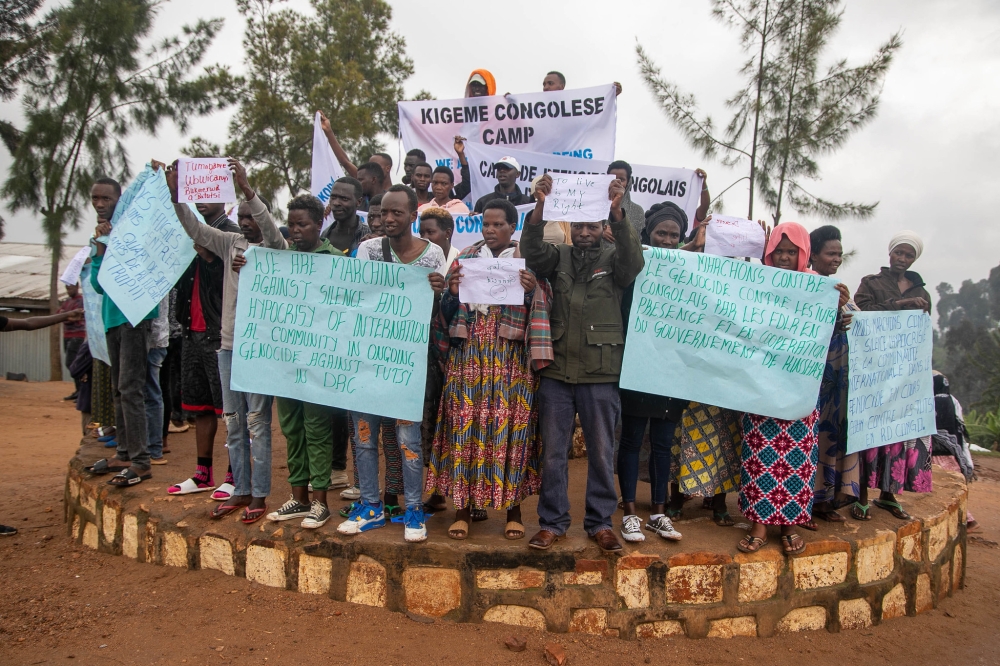

During this time of commemoration, I would like to express my sympathy to the people of Rwanda. As a Congolese refugee in Rwanda for 29 years, my life was turned upside down by the tragedy this country experienced in 1994. Indeed, my family and I had to flee Congo when extremists arrived.
So I know what it means to be hunted, persecuted, and to lose everything.
Victims of history
In the collective memory, the terms 'refugees' and 'Zaire' evoke the endless queues of millions of Rwandans who, at the end of the genocide, fled to eastern Zaire - now the DR Congo.
But we often forget the result of this exodus: this massive arrival of refugees included genocidal forces who set up their camps just a stone's throw from the border. Having taken with them the military arsenal and machetes they had used during the genocide, they were ready to complete their extermination mission.
They soon began persecuting Congolese Tutsis, and other local communities assimilated to the Tutsis.
I come from a small village called Kaniro, west of Goma, in the Masisi - an isolated but quiet area where I spent a happy and comfortable childhood with my family. As my father was a religious leader, we had four houses to accommodate faraway travelers.
These houses were surrounded by fields where my mother supervised tens of laborers while my father looked after a dozen cows in his spare time in an evergreen pasture.
This quiet and peaceful life changed in July 1994 when Hutu extremists arrived in our village in masses.
Moved by the destitution of these refugees, it was natural for my father to welcome them into our home. But his generosity marked the end of our happy years.
One day, one of the people we were hosting - a man from Rwanda - led Congolese Hutus to our home to kill my father, who only escaped death thanks to a friend's alert.
The man we had taken in, who betrayed my father, came from one of the refugee camps near Goma.
Ironically, to survive, we found refuge in Rwanda in September 1994, just two months after the country had emerged from the horror of the genocide against Tutsis.
Forgotten refugees
Today, my future, like other Congolese Tutsi refugees, remains uncertain. I am glad that I was able to find refuge in Rwanda. But with the continuing insecurity and increasing discrimination, I wonder if we will ever be able to return home.
But what is most appalling is that our own government denies our existence. Except for the spontaneous return of about 4,000 Congolese refugees in 2003, no organized repatriation effort has been undertaken by Kinshasa.
Moreover, the recent outbreak of hate speech and calls for violence against Rwandan-speaking populations only diminishes our hope of ever returning home.
Since the beginning of the M23 crisis, both national and international media coverage has focused on the thousands of Internally displaced people around Goma.
And unsurprisingly, those who have been stranded in Rwanda for more than 25 years, as well as in other countries in the region, remain virtually ignored by the press and the international community.
History repeats itself
My personal story reflects the cruelty and complexity of unresolved conflicts, misunderstood conflicts, and the consequences of bad governance and bad faith on the part of national authorities.
For example, the current chaos in eastern Congo could have been avoided as early as 1994 if the then-Congolese government had, like Tanzania, disarmed the Rwandan soldiers.
Similarly, the international community has betrayed us. The United Nations has become accustomed to the quasi-permanent insecurity in Eastern DR Congo and has joined the dance of the irresponsible people who, unfortunately, run our country. Forced to work with the local authorities, the UN missions can only bend to the will of Kinshasa, which is content with a short-term policy, without addressing the root causes of this cyclic violence.
The last presidential election in the DRC had raised a lot of hope among us. We believed that the election of Félix Tshisekedi, and his partnership with Rwanda, would mark the end of the FDLR and the proliferation of armed groups in the east.
But his about-face and his stubbornness in pointing the finger at Rwanda - and by extension, at the Rwandophone Congolese - as the scapegoat for our country's ills to make people forget about his poor record in office has made the pacification of eastern Congo more illusory than ever.
Next year will mark 30 years since the genocide against the Tutsis and my third decade as a refugee in Rwanda. While the future looks bleak, the reconstruction of Rwanda gives me hope that my country will one day choose the path of unity and good governance so that my children can see the house I grew up in.
The author is a Congolese refugee in Rwanda and preferred to use a pseudonym to protect her family back in DR Congo


